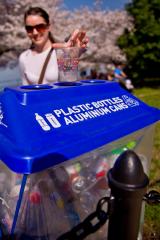Between residents, businesses, and institutions, the City of Boston generates around 1,156,000 tons of waste every year, with only 25% diverted from landfill—a full 12% lower than the national average.

Source: epa.gov
For Bostonians, the news gets worse, and in fact, of the 874,000 tons sent to incinerators and landfills, an estimated 75% is potentially recyclable or compostable.
It’s no surprise then, that a few years ago Boston set out on an ambitious zero-waste plan to reduce the amount of garbage the city produces and increase the amount of municipal solid waste that is reused, recycled, or composted.
In addition to local government initiatives by the City of Boston, numerous private enterprises have also stepped up to contribute to the zero-waste movement in the city, and the private sector is not alone, with community-driven recycling programs and other initiatives designed to drive circular economy concepts to the forefront of the city’s waste programs.
Combined, all three sectors are making headway on the path to a zero waste Boston. Here, we look at how the city defines its zero waste goals and what it is doing to reach them with the help of the entire community.
A History of City Innovation — Zero Waste Boston
In 2016, as part of Boston’s broader Climate Action Plan to become carbon-neutral and climate-ready by 2050, the City of Boston and the Zero Waste Boston Coalition (formerly Boston Recycling Coalition), developed four “Guiding Principles for Implementing Zero Waste in Boston:”

Source: boston.gov
- Make zero waste a key priority: define the goal, develop a strategy, expand resources, work collaboratively.
- Focus first on using less and diverting more: lead by example, facilitate residential waste reduction, engage large generators of waste.
- Support this work through local business development: work on job training; draw on leadership in innovation and research; encourage measures to improve the safety, health, and jobs of workers; put materials to highest and best use.
- Sustain this work through culture change: build a culture of zero waste citywide, engage meaningfully with all stakeholders, embrace all communities, conduct linguistically and culturally appropriate public education, grow the next generation of zero-waste leaders.
These original principles led to the appointment of the City of Boston Zero Waste Advisory Committee, which set out in 2018 to formalize a set of recommendations to reduce, reuse, recycle, and compost between 80-90% of the city’s solid waste by 2035.
Like other major urban centers in the US, Boston was looking to become a zero-waste city, with Chief of Environment Christopher Cook and Chief of Streets Chris Osgood co-chairing the committee that released its final recommendations in mid-2019. This comprised of four core goals:


1. Reduce and Reuse
Reduce and reuse was given the highest priority, as in general waste hierarchies, since it delivers the greatest benefits. The strategies recommended included short-term goals such as citywide public education campaigns and longer-term solutions such as increasing the availability of repair options—a major issue in many communities as the fight for the right to repair intensifies in the US.
 2. Increase Composting
2. Increase Composting
Composting was also considered an important factor, with the committee discovering that more than 35% of current waste in Boston was compostable. Short term suggestions included pilot projects for residential composting and an expansion of commercial composting for food waste and yard waste, while longer-term goals were to scale both of these solutions for the greatest impact possible.

3. Recycle More and Recycle Right
Not only focusing on increasing the amount that could be recycled, the Boston zero-waste plan also looked to help people realize that much of the existing waste stream (around 40%) was already recyclable. Thus, some of the short-term goals included educating Boston residents, businesses, and visitors to recycle correctly and expanding the infrastructure for hard-to-recycle materials, while their long-term strategy was to create more equitable curbside collection services.

4. Inspire Innovation
Seeing themselves as the vanguard of zero waste, Boston put special emphasis on the need to inspire and promote product, technology, and business model innovation. In the short term, this included changes to the city’s own purchasing practices and supporting green jobs, while longer-term it looked towards funding new ideas and approaches and supporting a zero-waste research and development network.
As part of this movement towards zero waste, the city of Boston also produced various zero-waste toolkits. One was aimed at residents, with actionable ways to follow Zero Waste Boston’s general aims. Additionally, there are a number of toolkits for businesses with the Commission reporting that they, along with institutions, accounted for 80% of the city’s waste.
These toolkits are divided into four main segments: office buildings, food vendors, retailers or manufacturers, and schools or hospitals. Each of these offers up a large list of possible actions divided into seven key areas:
Rethink
Focused on the planning aspect of waste reduction, including examples of actions such as carrying out a waste audit and noting your “trash vendor” along with the regularity of pick-ups and drop-offs.
Redesign
Actions primarily focused on operational changes that can help a Boston business go zero waste, such as adjusting the size and regularity of waste collection and implementation of waste stations.
Reduce
As opposed to redesigning how to deal with waste, this category aims to reduce a business’s waste at the source, with recommendations such as buying in bulk, going paper-free, and communicating with suppliers to reduce packaging or going plastic-free.
Reuse
As the name would suggest, here the aim is to get rid of single-use items. In a business, this can be achieved by using washable/reusable bags, storage containers, and water bottles; creating a swap area for office supplies; and donating surplus or outdated technology, for example.
Recycle and Compost
A valuable step in achieving zero waste, the toolkits have suggestions such as how to find companies that are able to effectively haul compost and recycling materials, collecting food scraps, and training employees in proper sorting techniques.
Close the Loop
These goals are based on working with companies that also implement zero-waste policies, sourcing post-consumer recycled products, and trying to purchase locally when possible.
Education
In addition to training employees, stakeholders, and students, there are also suggestions for increasing signage and tracking the success of your other policies. Before this comprehensive review, Boston had already implemented a number of changes to try to reduce waste. One such example is the city’s plastic bag ordinance, which came into effect in December of 2018.
This directive banned shops from stocking single-use plastic bags with handles. Instead, any grocery bags offered now have to be either reusable, recyclable paper bags, or compostable bags. What’s more, any handled bag must cost a minimum of 5 cents to customers. While it might seem like a small step, it’s tackling a huge problem with Americans using around 100 billion plastic bags a year.
However, not all waste reduction is top-down, and while the recommendations of the City of Boston are extremely useful to try to tackle the problem of waste across general businesses, there have also been many private initiatives with zero waste as a founding principle.

Source: bostonzerowaste.com
Private Initiatives for a Zero-Waste Boston
One of the first zero-waste grocery stores in Boston, Cleenland, is primarily a bring-your-own container store. It focuses on reduced (or no) packaging and buying in bulk, which are two key principles of going zero waste. Customers bring their containers, or purchase one at the store, weigh them empty, fill them up, and pay the difference.
Another retailer pushing zero waste into the mainstream is Boston General Store, which has a focus on non-disposable, long-lasting, and high-quality goods. This includes consumables that can be purchased in bulk such as shampoo, conditioner, laundry soap, dish soap, deodorant, and more, as well as a heavier emphasis on zero-waste accessories and gear.
Originally a brick-and-mortar shop in Somerville, Make & Mend is now entirely online, but still stands as an incredibly unique zero-waste project in Boston by recycling and reusing art and craft supplies. Founded in 2017, its goal is to make art supplies more accessible to the community and in the process reduce the amount of waste in art as well as promoting the need to repair rather than replace.
Communities Pushing for Zero Waste in Boston

Source: boston.gov
In addition to government initiatives and commercial ventures, there are also numerous community groups fighting for a greener, cleaner, zero-waste Boston. One notable body is the Boston Area Sustainability Group which describes itself as a “robust community of subject matter experts equipped to collectively drive sustainability forward.”
They organize events with a scope much broader than zero waste initiatives, and with membership in the thousands, the organization is making strides towards a more sustainable Boston in general.
The Zero Waste Project by the Conservation Law Foundation, based out of Boston, aims to “protect Massachusetts communities from the dangers posed by unsustainable waste management practices.” They do so by raising awareness around the dangers and impact of waste and advocating for a shift to a zero-waste model in Boston, Massachusetts, and eventually all of New England.
One joint venture — a community initiative that is part of the broader Zero Waste Boston project — is Greenovate, which empowers Bostonians to carry out the city’s climate action plan in their neighborhoods and communities.
This program includes urban wild cleanups and street cleanups as well as an in-depth guide for residents to reduce their contribution to climate change.
This final project represents a step towards the broader shift needed to make a truly zero-waste Boston, where governmental initiatives, private ventures, and community-driven projects come together to tackle the problem that is both caused by and affects all of them.
For more information going zero waste in your home or business, subscribe to zerowaste.com or follow the Zero Waste Blog. For further insight into how your business can work towards zero waste, arrange a chat with one of our TRUE Advisors.








